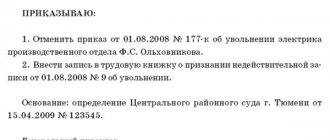An important document for any working citizen is a work book. It records the employee’s labor “history”: when he got the job, how much he worked, when he was fired, under what article, as well as special awards and incentives. Registration of an ordinary worker is mainly carried out by the manager, that is, the director. Everything is done according to the main scheme based on the Labor Code of Russia. It is necessary to talk in more detail about how and by whom the entry in the work book about hiring a director is made.
The document on the basis of which an entry in the work book about the appointment of a director is made
If we take into account that the entry is made in a general manner, then the basis for the entry should, like everyone else, be the order to hire the enterprise. But, taking into account the specifics of hiring a director and the fact that the very wording of the entry speaks of appointment and not hiring, it would be more appropriate to refer to a document of the constituent body (decision of the board of directors or meeting of shareholders, order of a higher organization, etc.). What to choose?
No regulatory document or rules for maintaining work books prohibit the indication of two documents at once in the column of the basis for making an entry. Therefore, if you indicate in the entry the details (date, number) of the hiring order and the decision of the constituent body on the appointment of a director, you will not make a mistake. But you will be insured against possible questions and complaints from regulatory organizations.
Requirements for a candidate
A candidate for the position of General Director must meet these requirements:
- Completed higher education. For example, this could be an economic or legal education. These are standard conditions. However, the society can provide special services. For example, medical. In this case, it makes sense to hire a director with a medical education.
- Experience. This condition is not specified in regulations, but employers usually consider applicants with experience. Effective problem solving is only possible with practical experience. Generally, 3 years of experience in a management position is desired.
- No criminal record. You cannot hire people who have been convicted of economic crimes and have received restrictions on holding leadership positions.
- Age. Typically, employers hire employees between 30 and 50 years of age.
This is just a sample list. It can change according to the wishes of the employer. However, the requirements for the applicant cannot contradict the law. In particular, there can be no restrictions based on gender, race or age. If an employer has unlawfully established a qualification, he is held legally liable.
How to formulate an entry in the work book about the appointment of a director?
If the entry is formulated on a general basis, it may sound like “Accepted as director...”, but instructional documents often offer the option “Appointed to the position of director...”. The same can be read in the text of the founder’s decision (resolution). The first method, of course, will not be wrong, but the second is preferable.
There is no need to write the name of the company after the word “directors”, since it is already indicated above. But if the director’s position involves the management of a structural unit of the organization (director of a branch, factory, production association), or the structure of the enterprise requires the presence of several directors (for personnel, sales, development), then the recording needs to be continued. The full name of the structural unit or position is indicated.
Director as head of the organization
The procedure for hiring a senior manager depends on which company the director will work at. As a rule, in state and municipal institutions (administration bodies, courts, preschool and school educational institutions, hospitals and clinics) the head is chosen on a competitive basis. If we are talking about various types of joint stock companies, partnerships and LLCs, directors are elected by secret or open voting. Here are the main differences between a director and ordinary employees:
- A director is a specialist who has other people subordinate to him; their number may vary depending on the enterprise.
- The manager is responsible for the activities of his company before the employees and before the law.
- The boss has the right to appoint his deputies from among his subordinates. A deputy is a person who performs the duties of a manager in his absence.
- The director interacts with higher authorities on behalf of the enterprise and its employees (with the court, prosecutor's office, tax office).
In this regard, the procedure for hiring and firing a manager differs significantly from the employment of his subordinates. For example, an entry about
Taking office
The procedure for hiring a manager, in fact, is almost no different from the employment of ordinary employees - his subordinates. The first thing the manager must do is contact the HR department and provide all the necessary documents. By presenting his own documents, the manager has the opportunity to write a statement. If an organization does not have a human resources department, employment issues are usually addressed to the secretary. To apply for a managerial position, a specialist must provide the following documents to the secretary or head of the personnel department:
Read more: How to correctly draw up an employment contract with an employee
- An identity card for Russians and CIS citizens is a passport. If the passport is missing for some reason (lost or is in the passport office, in the registry office), the specialist provides a certificate replacing the passport.
- SNILS pension insurance certificate.
- TIN. People can be hired without a tax identification number, but in this case difficulties may arise with the calculation and calculation of wages.
- Application for a job. It is written according to a sample; it can be obtained from the secretary or from the personnel department.
- Document (diploma, certificate) of secondary specialized or higher professional education. A specialist who has an academic degree of Doctor or Candidate of Sciences must provide documents confirming the existence of this degree.
You will also need photographs and a completed application form. Photocopies are made of all documents, and the documents are entered into the manager’s personal file. After this, a record of employment is made and the director can begin his duties. The hiring and dismissal of a director is recorded in the work book according to the model by the same person who hires the boss.
Dismissal procedure
The director is the same employee of the enterprise as the lower-ranking personnel, therefore he, like other specialists, can be fired. The manager also has the right to decide to resign at his own request or due to reaching retirement age. There are situations when a boss leaves a leadership position to make room for his successor, a young, competent employee. In any of these cases, the dismissal procedure will be approximately the same as the dismissal procedure for ordinary employees . If a manager has made a firm decision to resign from his post, he must:
- Notify your subordinates, the actual owner of the company or the board of directors about your departure at least fourteen days before the expected departure.
- Write a letter of resignation of your own free will, for family reasons or by agreement of the parties. Statistics show that most often managers leave their positions of their own free will. The option “by agreement of the parties” is possible if the decision to remove the boss from office was made at the board of directors, and no one, including the person being dismissed, raised any objections. The application must indicate the reason and date of departure.
- Appoint a deputy who will perform leadership responsibilities after the departure of the old director.
- Receive compensation from the accounting department for unused vacation (if the boss has not yet been on vacation this year) and receive your book in your hands (from the human resources department or from the actual owner of the company). The book is issued directly on the day of dismissal.
When all documentary formalities are settled, the director is officially considered dismissed. He can either leave the company or take another position in it. It all depends on the desire of the leader and the situation. If the boss resigns due to the liquidation of the enterprise, information about the liquidation of the company must be indicated in the work book. If the dismissal of a director occurs by decision of the founder, the entry in the employment record must necessarily contain the name and surname of the founder (if it is an individual) or the name of the founder (if it is a legal entity).
How to make an entry in the work book about appointment as director?
Otherwise, the entries in the director’s work book are identical to all other entries when hiring for any other position:
- The heading placed in column 3 is the full and, if available, the short name of the enterprise (organization). It is possible to affix a special stamp with the name.
- The entry number strictly corresponds to the continuous numbering of entries in the work book.
- The date is placed in the fields provided for day, month, and year. The year is indicated by four digits, the month and day by two, with a zero if necessary.
- Entries in columns 3 and 4 are made in accordance with the formulations and supporting documents discussed above.
Since hiring a manager is carried out according to general rules, the director must be familiar with both the hiring order and the entries made in his work book. This is mandatory even if he is the only employee of the enterprise and prepares everything himself. There are no prohibitions for this in the legislation.
Special cases
How to make an entry in the work book about the appointment of a director if he is the sole founder of the enterprise? The problem of such registration for work is not clearly reflected in the current legislation. The Labor Code of the Russian Federation deals with the relationship between employers and employees, but does not provide for a situation where there is practically no employer. How and on what basis can an entry be made in the work book in this case?
On the one hand, the employer is absent. But on the other hand, the manager acts as an employer for all other employees. Although the conclusion of an employment contract by the same person on both sides is not allowed, the law does not prohibit the director from signing an order on his own hiring or taking on a position. And if there is an order, based on it, you can make a corresponding entry in the manager’s work book. If there is no other personnel suitable for this in the company, then the director can do this himself.
Powers of the General Director
The CEO is one of the key persons in society. This is the only person who can act on behalf of the entire organization without a power of attorney. Since the director has an expanded list of powers, high demands are placed on him. Let's consider the functional responsibilities of a specialist:
- Full control over the functioning of the organization.
- Coordination of the work of branches.
- Ensuring the productivity of the entire staff.
- Formation of a work plan for the company.
- Creation of company development strategies.
- Control over the fulfillment of set goals.
- Control over document flow.
- Implementation of planned events.
- Drawing up a budget plan.
- Analytical activities to establish performance results.
An LLC can be created by one founder. In this case, he will also be the general director. This position has both disadvantages and advantages. Among the advantages is the absence of the need to report to superiors. However, there is also a minus: the presence of increased responsibility. The founder must have all relevant knowledge. The main function of the general director is control over all areas of the organization's activities. The specialist solves priority problems. Non-essential work is delegated to other employees.
Features of registration when moving from one organization to another
If the director of one enterprise transfers to a managerial post in another organization, then for this case there are two ways to reflect this transition in the entries of his work book:
- It is possible to arrange a transfer from one main job to another, as provided for by labor legislation. In this case, a corresponding transfer order is issued, and on its basis an entry is made in the work book with the text “Transferred to ... (name of enterprise or organization) to the position of director.”
- A more complex, two-stage option involves first dismissing the director from his previous job and then hiring him in a new organization. Dismissal and hiring require the publication of relevant administrative documents. There will also be two entries in the manager’s work book.
The procedure for registering dismissal from the position of director and making an entry in his work book is similar to hiring.
Conditions for appointing a person to the position of General Director
To appoint a specific person as CEO, several main steps are carried out:
- Convening a general meeting where all shareholders are present).
- Discussion of the candidacy and the time frame for which the person is elected.
- Decision on the appointment of the general director.
- An agreement is signed between the employer (the elected chairman) and the general director.
- Issuance of an order stating that the general director is taking over the post.
Before holding a meeting, you must notify its participants in advance. Next, they must be registered. If a person has not passed the registration stage, then he does not have a place as a voting participant. Personal presence at the shareholder meeting is not necessary, as the participation of appointed representatives is permitted. The powers of these persons are determined by a special document (power of attorney).
An employment contract is drawn up and concluded in accordance with the law, where the requirements in this case apply to everyone (Articles 67-68 of the Labor Code of Russia). The contract must reflect the following aspects:
- place of work of the manager and places visited in connection with his official position}
- position and its name, which must be on staff}
- responsibilities of the general director}
- working conditions, if they do not coincide with the general ones.
Due to general rules, no more than three days are allotted for reviewing this document.
After completing these important procedures, you need to inform the tax authority about the appointment of a person as general director and record the information in the Unified State Register of Legal Entities.
Conditions for appointing a person to the position of director
To appoint a person as a director, you also need to:
- Organize a meeting of directors (council).
- Discuss candidates nominated for the post of director.
- Take a vote.
- Record all results.
- Make a decision on the appointment of a director.
- Draw up an employment contract with a manager (Article 16 of the Labor Code of Russia).
- Sign the agreement on both sides.
If the enterprise is a unitary state and municipal enterprise, then concluding an agreement is the right of the owner of the enterprise.
Election and appointment to a leadership role in a company can also be carried out in favor of a person who was not a member of the management body. A person who has served as a director for a period of time should not be automatically appointed to that leadership position. His candidacy can also be considered at the meeting, and only after an overwhelming majority of votes in his favor can he be appointed director.
According to the Labor Code of Russia, when an employment contract is drawn up, the terms of the probationary period are discussed at the same time. This is done to ensure the person's suitability for the position. Here, an agreement between the parties is required (Part 1, Article 70 of the Labor Code of Russia). Despite this, an employee can be hired without a temporary test if there is no doubt about his competence. The same conditions apply for the appointment of a person to a management position.
Calendar numbers that may be associated with the appointment of a person to a leadership position often do not coincide (election, conclusion of an agreement, assumption of duties).
Dismissal
STEP 1. The owners make a decision to dismiss the director.
If a director resigns due to the expiration of his employment contract or at his own request, then the participants (shareholders, board of directors) do not need to make a separate decision on termination of the director’s powers. In other cases, it will be needed.
A director can be dismissed on the same grounds as other employees. But the Labor Code also provides for special grounds for him. For example, a director can be fired if:
- adoption by the general meeting (board of directors) of a decision to terminate the employment contract with him
- removal from office in the event of bankruptcy of an organization in accordance with insolvency legislation
- making an unreasonable decision that resulted in damage to the organization’s property
- one-time gross violation of one’s labor duties
- disqualification
STEP 2. Warning of upcoming dismissal.
Depending on the reason for termination of the employment contract, the parties are subject to, in particular, the following notice periods:
- the director resigns of his own free will, he must notify the owners (board of directors) about this at least 1 month in advance
- the employment contract is fixed-term, then the director must be notified of the upcoming dismissal 3 days before the end of the employment contract. This must be done by a person authorized by the charter or by a decision of the general meeting (for example, the chairman of the board of directors; a participant (shareholder) convening the general meeting). Rostrud specialists also think the same.
FROM AUTHENTIC SOURCES
“The employee must be notified in writing of the termination of the employment contract due to its expiration at least 3 calendar days before dismissal. This provision does not provide for any exceptions for heads of organizations. Thus, the manager should be warned in writing about the termination of the employment contract. Such an instruction is given, as a rule, to a representative of the organization’s owners, who has been tasked with concluding an employment contract with the manager. If there is only one owner, he does it himself
Here is a sample warning.
Director of LLC "Akvarel" E.A. Romanov
Warning about termination of employment contract
Dear Evgeniy Alekseevich, we notify you of your upcoming dismissal on 08/21/2012 due to the expiration of the employment contract No. 1 dated 08/22/2009 concluded with you.
At the same time, we draw your attention to the fact that at the extraordinary general meeting of participants of Akvarel LLC, which will take place on August 17, 2012, your candidacy will again be considered for appointment to the position of General Director of Akvarel LLC. And if you are re-elected to this position, your employment contract will be extended for a new term.
| LLC "Akvarel" |
| Warning |
If a director with whom a fixed-term employment contract is concluded is re-elected for a new term, it is not necessary to fire him and then rehire him. You can simply conclude an additional agreement to the employment contract to change its validity period. For example, if the employment contract was concluded for a period of 2 years, then the agreement can set a period of 4 years. Rostrud does not object to this procedure. However, keep in mind that if the validity period of the employment contract after its extension is more than 5 years, then the contract will not become indefinite.
STEP 3. Issuing a dismissal order.
In the last days of exercising his powers, the dismissed director must issue an order for his dismissal in the form and sign it for familiarization. If he has not done this, then in principle, one decision of the owners (board of directors) is sufficient to formalize the dismissal. Rostrud also agrees with this.
FROM AUTHENTIC SOURCES
“ All issues related to the registration of the dismissal of a manager are resolved by the owner of the organization or his authorized person. An order to dismiss a manager is not issued. In the work book in column 4 the decision of the owner is indicated
SHKLOVETS Ivan Ivanovich Rostrud
But since such an order is still required by law, claims from the labor inspectorate cannot be ruled out during the inspection.
STEP 4. Making an entry about dismissal in the work book.
On the day of dismissal, according to the general rules, an entry about the dismissal must be made in the director’s work book. The entry must exactly correspond to the text of the order and the wording of the Labor Code and can be, for example, like this.
After recording, you need to put the signature of the person responsible for maintaining work records (this can be the director himself) and the seal of the organization. And then, against signature, familiarize the director with the notice of dismissal
STEP 5. Making an entry in your personal card
Based on the dismissal order, complete the director’s personal card according to the form and ask him to sign it
STEP 6. Payment with the director and issuance of a work book.
On the last working day, the director needs to issue a work book against signature (in the work book movement book) and pay the amounts due to him. Let us remind you that the calculation of dismissal payments is drawn up using a calculation note in the form
He also needs to issue a certificate about the amount of salary and other payments for which insurance premiums were calculated, and other documents related to work that the director will ask for.
WE WARN THE MANAGER
The director is also an employee. Therefore, in order to avoid problems with the tax office, the Social Insurance Fund, or the labor inspectorate, the same number of personnel papers must be drawn up for him as for any other employee.
Do not ignore the obligations established by the Labor Code to document labor relations with the director, even if he is the only participant (shareholder) of the company. Draw up an employment contract, orders using standardized forms and other necessary papers. This way there will be fewer complaints against you from labor inspectors, the Social Insurance Fund, and the tax authorities. After all, in the absence of mandatory personnel documentation, labor inspectors can fine the company for violating labor legislation by the Social Insurance Fund and refuse benefits. And tax authorities may try to exclude accruals in favor of the director from “profitable” labor costs








